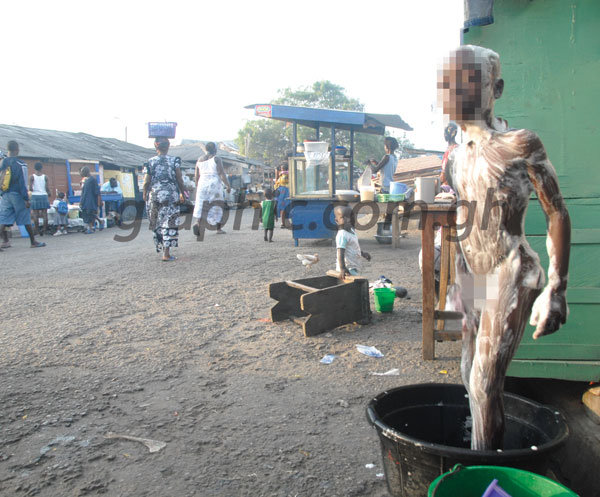Roadsides not 'bathroom' for kids
 For many Ghanaian children, especially those in the urban
poor areas, the sides of the country’s dangerous roads have over the years
served as bathrooms, where they bathe during the day and in the evening,
exposing them to fatal motor accidents while demeaning their dignity.
For many Ghanaian children, especially those in the urban
poor areas, the sides of the country’s dangerous roads have over the years
served as bathrooms, where they bathe during the day and in the evening,
exposing them to fatal motor accidents while demeaning their dignity.
Advertisement
Driving through some deprived suburbs of Ghana’s capital, Accra in the mornings and evenings, one sees stark naked children, some as young as four years, standing by very busy roads with buckets of water, washing down and sometimes playing with other children, who are also bathing, oblivious of the danger posed by the vehicles that pass by.
This practice contravenes Part 1, Section 6 (2) of the Children’s Act, 1998 (Act 560), which states in part that “Every child has the right to…dignity and respect…”
And 6 (3/a), which avers that, “Every parent has the responsibilities, whether imposed by law or otherwise towards his/her child, which include the duty to protect the child from exposure to physical hazards”.
Child’s rights advocate, Mr Bright Appiah, told The Mirror that the practice of children bathing by the roads was just one of the many unfortunate ways in which they were exposed to danger on a daily basis.
“Very young children are left to travel relatively long distances alone from home to school; crossing roads dangerously and also playing on the roadsides”.
He therefore urged the government to introduce a policy that would discourage parents from sending their children to schools that were far away from their homes. “Very good community schools should be established in all suburbs,” he suggested.
A legal officer at the National Road Safety Commission, Mr Kwame Koduah Atuahene, observed that 42 per cent of people who suffered injuries or death on the roads were pedestrians while about 15 per cent of all pedestrian deaths in the country involved children between zero and six years. “Child safety on the roads is therefore a priority concern to the commission”.
He, however, conceded that though he and other members of the commission had seen children bathing by busy roads, thus exposing themselves to motor accidents, the commission had not singled out that practice for particular attention. “We will consider that seriously,” he assured.
Commenting on children and adults who also exposed themselves to motor accidents while watching football and other programmes on television in electronic and other shops by roads, Mr Atuahene said “we envisaged that there was a potential risk of getting involved in motor accidents while watching football so close to the roads”.
Therefore during the last two African Cup of Nations tournaments, he said, the commission designed special programmes to educate the public on the need to be careful on the road. Now, with the European leagues attracting more people to roadside bars and shops, he said the commission would intensify its pedestrian education campaigns.
“We will liaise with the police Motor Traffic and Transport Unit (MTTU), the regional and district offices of the National Road Safety Commission to extend our outreach programmes to educate football fans across the country to be aware of their safety on the roads.”
With regard to clearing hawkers from the road to save them from motor accidents, Mr Atuahene said the Accra Metropolitan Assembly (AMA) and the assemblies had shown commitment and should be encouraged, “so that together we can build consensus on road safety”.
He pleaded with motorists to be careful at all times in order to save lives, while advising parents to make the welfare of their children a priority concern.
Story by William A. Asiedu/Mirror



